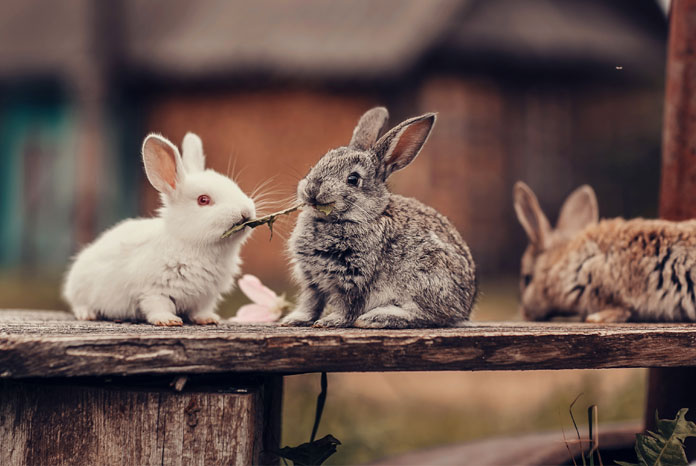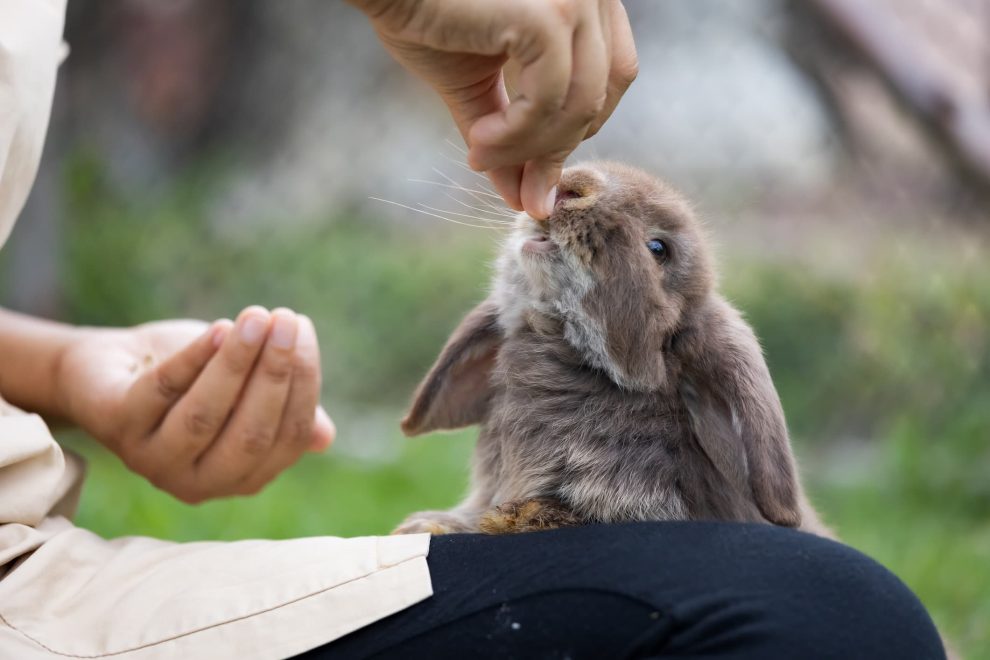IRRESPONSIBLE breeders are exacerbating the problem of unwanted rabbits, leading to overwhelmed RSPCA animal centres experiencing a staggering 48% increase in rabbits being brought in last year.
As part of Rabbit Awareness Week (26th to 30th June), the animal charity is calling on people to prevent the growth of unwanted litters by promptly neutering and correctly identifying the sex of their pets.
Rabbits have a rapid breeding cycle, resulting in RSPCA centres being inundated with abandoned and unwanted animals. Many owners have discovered their rabbits breeding uncontrollably, often due to the inadvertent sale of misidentified pairs.
Over the past year, RSPCA officers have encountered appalling cases of neglect that highlight the problem of individuals disregarding rabbit welfare through haphazard breeding practices.
Currently, the RSPCA Kent North West Branch is caring for four giant-breed New Zealand rabbits following a prosecution case. These rabbits were previously raised for meat in deplorable conditions on an allotment in the North East. After arriving in RSPCA care, Marilyn (pictured right) gave birth to eight babies, and branch staff are seeking to rehome her with one of her daughters, Maddie (left). Two more of Marilyn’s offspring, twins Dolores and Luisa, are also in search of new homes. These rabbits have been with the branch for over a year, having been relocated from a private boarding establishment in Kent to increase their chances of finding new homes.
Becky Blackmore, Manager of the RSPCA Kent North West Branch, states that the branch, along with other centres within the charity, has been under tremendous pressure as rehoming rates have declined in recent years.

In 2022, the number of rabbits being taken in by the RSPCA rose dramatically by 48%, with 1,090 rabbits arriving at animal centres and 1,942 being rescued by RSPCA branches.
Although the figures for this year indicate a decrease compared to the same period last year, numerous RSPCA centres are now operating at full capacity and are unable to accommodate more rabbits. From January to May of this year, 307 rabbits were brought into RSPCA animal centres, and 308 arrived at RSPCA branches. Additionally, 93 wild rabbits were taken to the charity’s four wildlife centres.
Becky comments, “Some rabbits have been in private boarding establishments for a year, and others have been there for many months due to capacity issues at our centres. Over the past year, it has cost the RSPCA tens of thousands of pounds to keep rabbits in private boarding as the rehoming process has been slow. The costs are staggering.”
To alleviate the waiting list pressure, the RSPCA strives to accommodate as many rabbits as possible, as they did with Marilyn. The organization provides space and works to find them suitable homes. Marilyn and other rabbits were part of a group that was bred for meat on an allotment, where they were kept in horrendous conditions.
The branch aims to replicate its success in rehoming another extended bunny family, whose owners failed to neuter them, leading to an explosion in their numbers. Sarah and Hector (pictured) arrived in Kent with their offspring, Johnny, Meena, and Ash, and were promptly neutered upon arrival. However, Sarah became pregnant again, giving birth to five more rabbits. It took the branch a year to rehome all the bunnies. If neutering had been done earlier, the costs of surgery, vaccinations, and microchipping could have been avoided.
In another case involving rabbits bred for consumption, RSPCA officers rescued 42 Giant Flemish rabbits from an allotment in Ashington, Northumberland, in July 2022. These poor animals were living in cramped hutches and were allowed to breed with each other to maximize numbers for the meat trade. Several of the charity’s centres and branches, including those at RSPCA Great Ayton and RSPCA Northumberland West Branch, successfully rehomed the rabbits. However, due to limited accommodations, some of them were taken in by RSPCA inspectors.
In Leicestershire, the RSPCA discovered over 160 rabbits living in overcrowded conditions in a garage. The owners had failed to neuter and promptly identify the sex of their rabbits, resulting in a significant increase in their numbers. Inspectors Helen Smith, Richard Durant, and Herchy Boal undertook a major rehoming effort, transporting the rabbits to RSPCA centres in Berkshire, Gloucestershire, Lincolnshire, Cambridgeshire, and Hampshire.
Inspector Durant commented, “This case exemplifies the problems that owners can face when they fail to neuter their rabbits and subsequently become overwhelmed. The owners claimed they tried separating them, but they were not quick enough, and the rabbits continued to breed, leading to an unfortunate situation. It was astonishing, and while most of the rabbits were in good health, their living environment was clearly unsuitable for their needs.”
A 2021 report by the PDSA revealed that 37% of the UK’s 900,000 pet rabbits were not neutered. However, the benefits of neutering rabbits outweigh the minimal risks associated with surgery, and most vets are willing to perform both castration and spaying procedures. The Rabbit Welfare Association and Fund advise that male rabbits can be castrated from 10 weeks old, while females can be spayed from four months.
Rabbit Awareness Week aims to raise awareness of the problems caused by unplanned litters, which contribute to an increase in the number of rabbits being abandoned or relinquished. Neutering rabbits not only reduces the number of unwanted rabbits but also helps them live longer, healthier lives. Approximately 80% of unneutered female rabbits develop uterine cancer after the age of three years.
Dr. Jane Tyson, the RSPCA’s rabbit welfare expert, emphasizes the rapid reproductive capabilities of rabbits and the challenges this presents to unsuspecting owners. She states, “This is why the theme of Rabbit Awareness Week 2023 is so important, especially at a time when rescue centres are inundated with calls for help from rabbit owners. We urge anyone who has not yet had their rabbit neutered to consult their vet about scheduling this crucial and routine procedure.”
Owners can inquire with their local RSPCA branches to determine if assistance is available for the costs of neutering. They can also find guidance on how to determine the sex of their rabbits.
The RSPCA, in collaboration with Burgess Pet Care and other animal welfare charities, offers free resources during Rabbit Awareness Week. These resources provide information on adopting rabbits from animal centres and proper rabbit care, including guidance on neutering. Rescue centres can access a free resource pack to share with potential adopters.


















